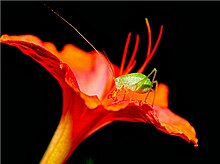Pterophylla camellifolia
| Pterophylla camellifolia | |
|---|---|

| |
| Scientific classification | |
| Domain: | Eukaryota |
| Kingdom: | Animalia |
| Phylum: | Arthropoda |
| Class: | Insecta |
| Order: | Orthoptera |
| Suborder: | Ensifera |
| Family: | Tettigoniidae |
| Subfamily: | Pseudophyllinae |
| Genus: | Pterophylla |
| Species: | P. camellifolia
|
| Binomial name | |
| Pterophylla camellifolia (Fabricius, 1775)
| |

Pterophylla camellifolia, the common true katydid, is a common North American insect in the family Tettigoniidae (katydids). Within the Tettigoniidae, it belongs to the subfamily Pseudophyllinae (true katydids). Other common names include northern true katydid and rough-winged katydid.[1][2][3]
The loud, rasping, three-pulsed song, rendered "ka-ty-did", of the male of the nominate northern subspecies is the source of the vernacular name "katydid” as applied to any tettigoniid.[4] It is a nearly flightless species that, in contrast with other katydids, often walks, runs, or hops rather than leaping or flying.[5] It lives in the canopy of deciduous trees, where it feeds on the foliage.[4][5] It can reach up to 50 mm (2 in) in length.[4]
Song
[edit]The singing rate is temperature dependent.[6][7] Four populations of this species can be distinguished by song characteristics:[4]
- The two-, three-, or four-pulsed song of northern populations, as described above;
- The faster song with more pulses per phrase, often heard in large, synchronized choruses common to the Southeastern populations;
- The one- or two-pulsed song of Southwestern populations; and
- A song of 8 to 15 pulses heard only in central Iowa.
-
Song at 20 °C, Illinois
Taxonomy
[edit]This species' original scientific name was Locusta camellifolia. The genus Pterophylla was created for it by Kirby in 1825. Three subspecies are recognized for P. camellifolia:[3]
- Pterophylla camellifolia camellifolia (Fabricius, 1775) – type locality is in the United States
- Pterophylla camellifolia dentifera (Hebard, 1941) – type locality is Hempstead County, Arkansas, United States
- Pterophylla camellifolia intermedia (Caudell, 1906) – type locality is Biloxi, Mississippi, United States
References
[edit]- ^ "Pterophylla camellifolia species Information". BugGuide.net. Archived from the original on 12 January 2018. Retrieved 27 December 2019.
- ^ "Pterophylla camellifolia Report". Integrated Taxonomic Information System. Archived from the original on 25 October 2011. Retrieved 27 December 2019.
- ^ a b Otte, Daniel; Cigliano, Maria Marta; Braun, Holger; Eades, David C. (2019). "species Pterophylla camellifolia (Fabricius, 1775)". Orthoptera species file online, Version 5.0. Retrieved 16 October 2019.
- ^ a b c d "common true katydid (Pterophylla camellifolia)". Checklist of Katydids North of Mexico. Archived from the original on 15 May 2024. Retrieved 13 August 2018.
- ^ a b Capinera, John L.; Walker, Thomas J.; Scott, Ralph D. (2004). Field guide to grasshoppers, katydids, and crickets of the United States. Ithaca, New York: Comstock Publishing Associates, Imprint of Cornell University Press. ISBN 9780801489488.
- ^ Franklin, M.; Droege, S.; Dawson, D.; Royle, J.A. (12 August 2009). "Nightly and Seasonal Patterns of Calling in Common True Katydids (Orthoptera: Tettigoniidae: Pterophylla camellifolia)". Journal of Orthoptera Research. 18 (1). BioOne Complete: 15–18. doi:10.1665/034.018.0108. Archived from the original on 10 August 2021. Retrieved 10 August 2021.
- ^ Elliott, Lang; Hershberger, Wil (2007). "Common True Katydid (Pterophylla camellifolia)". Songs of Insects.
